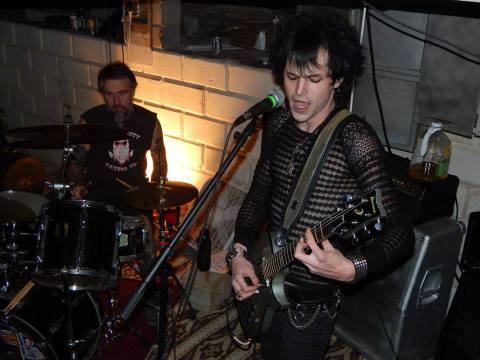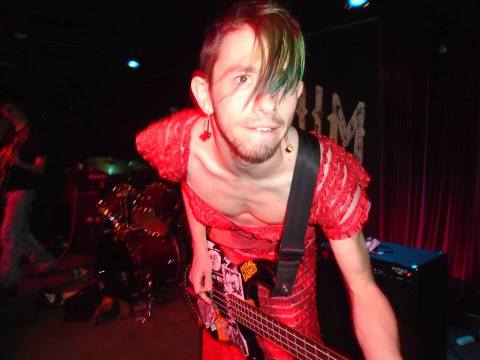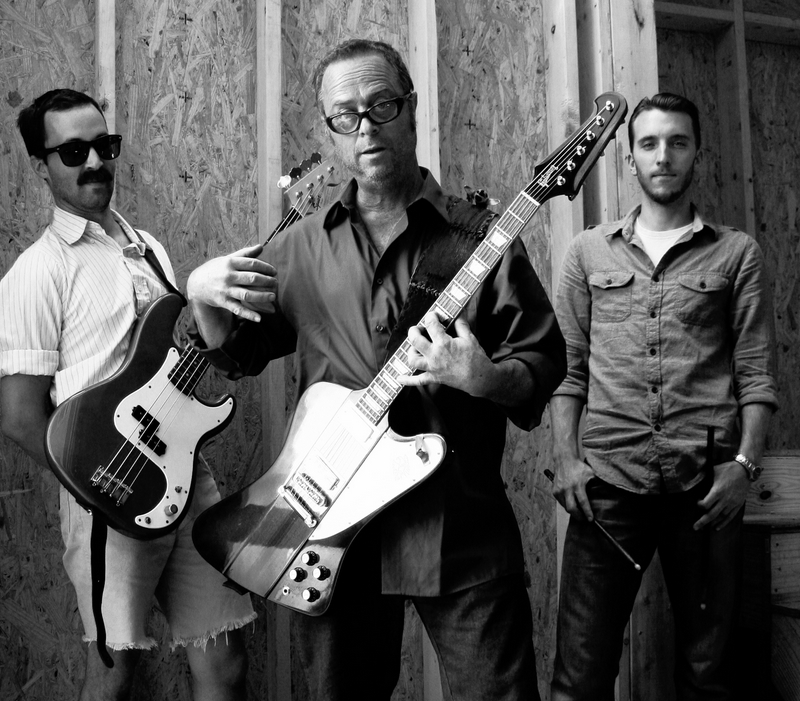In some of the grungier basements and venues of Asheville, punks gather to freely express themselves and reflect, through music, on whatever it is that needs to be said. “What is it about punk shows that draws people?” asks Hugh Huffstutler of local band Bulgogi. “It’s always in the same kind of place, with the same faces in almost any city. There is something homey about it — something inviting, even if the shows are in some dirty places.”

Slam Dunk House, one of Asheville’s newer basement clubs, fits this profile. Low-hanging ceilings, exposed pipes and cement floor set the ambiance of the DIY show space. “I purposely keep the basement looking pretty dingy,” says venue founder Wilton Jordan, who collects old mop buckets and other junkcore-styled objects in the venue for effect. “I think this kind of atmosphere invites people to be unrestrained. I want to have a space where artists can run with this raw feeling and express themselves to the fullest.” Despite the grungy appearance, on any given night a high-energy showcase puts local talent onstage with groups touring from all over the country.
“There’s a culture of support in the punk scene here,” says Bulgogi frontman Tim Tsurutani. “I think there is a level of enthusiasm and courtesy that you cultivate in this type of DIY music — especially for experienced groups that have toured around — that comes from being ground down by reality a bit. You have to face your limited resources, money, time and the music comes out of necessity. It’s about succeeding in the moment.”
Case in point, the raw intensity of a performance by local all-female band Zombie Queen (whose Emily Gibbs once ended the band’s set at The Orange Peel after apparently cutting herself on a broken bottle and bleeding onstage) or Kreamy ’Lectric Santa (the project of violinist and vocalist Priya Ray, who serves as inspiration for differently abled people). “If you don’t have experience with oppression and disappointment, I don’t think you can really ‘get’ what happens in this music,” says Tsurutani, who also includes pushing through the drudgery of low-paying jobs or dealing with a lack of popular support among the struggles that inform many bands.
A vital scene

While the roots of punk are deep and varied, artists who identify as such share a common ethos: to freely express themselves despite limitation or oppression and attacking the status quo through self-radicalizing actions. For the past three years, Bulgogi has been playing what the band half-jokingly refers to as “terrified child dance punk.” It’s music that is huge in scope, yet tightly wound, pocketing a tense but buoyant form of musical poetry. Tsurutani, the founding member, moved to town after spending a number of years in an Illinois punk scene. “There was a lot going on in Chicago,” he says. “But ultimately, the culture there was a bit too snobby — kind of elitist, more ‘chic.’ People in Asheville are definitely more inviting, friendlier and are actually willing to approach you and talk to you about your music.” Plus, he adds, there are a lot of seasoned groups in town who know how to deal with the aforementioned struggles of creating art while making it sustainable for themselves.
Craig Comeau, guitarist and singer in The Lords Of Chicken Hill, is one such guide to younger artists. A veteran of Boston’s art-punk scene from the late ’70s and early ’80s, Comeau has been an important figure in Asheville’s network of musical explorers since he founded The Lords in 2009. “Honestly, I really only pay attention to the music being made in Asheville anymore,” he says. “It’s a really vital scene. There are some amazing, really young people making music.” Pompos, a group composed of four local teenagers, for example, plays lean rock ’n’ roll that blends dissonant guitar harmonies with driving pop-punk structures. Their song “Coming Down” calls to mind early Strokes with fuzzed-out and undeniably catchy hooks.
“It definitely says something that three decades from the original movement, the ideals of punk are still present,” says Comeau. While the undercurrent of the aesthetic can yield art that is strange and/or volatile, Asheville seems to naturally support this form of expression. The curt one-liner melodies and bone-dry instrumentals of The Lords Of Chicken Hill, for instance, lend themselves well to the musical ecosystem of the city. In turn, the mature song-craft oddities that The Lords present serve as a green light to other musicians working outside the box.
“Craig is really the originator of the art-punk scene,” says John Kennedy of another local group, The Egg Eaters. “He’d been playing art punk out in the wilderness for years when it seemed like everyone in Asheville was only into Americana, bluegrass and folk. He knows everyone in the scene and is a big supporter of new bands.”
Photographic memory

While Comeau is something of a local art punk guru, the acting historian of the independent music scene in Asheville is Eron Rex, publisher of the ThrAsheville Zine, the first issue of which came out in June 2013. “The term art punk is pretty wide-ass,” says Rex. “Perhaps we’re talking about bands who are approaching or executing music with some conceptual bent. Whether by design or by accident, it manifests itself in a variety of sound styles.” Rex is often out three-plus nights a week with his camera capturing the sights and experiences of the scene. “He takes amazing visuals of every band and puts them up on his Facebook [page],” says Kennedy. That page is a visual library of most of the shows in Asheville’s “out” music culture: Rex’s growing archive captures a full spectrum of ages, genders and musical orientations.
“Even a screamo-violence band such as Mondays could be considered art punk in a way, as well as the horror-rock of All Hell, the submarine blues of Squidlord or the masked wrestler metal of Amnesis,” says Rex. “However, most of these performers would probably never proclaim themselves art punk.”
In a recent show at Slam Dunk House, mellow freak-folk group Brief Awakening shared a bill with Happyslap — a performer who, as Rex describes it, “rants paranoid visions backed by digital hardcore beats.” These two groups couldn’t seem more different, but somehow they click. They’re members of a complex music scene that some would readily call art punk and others would choose not to define.
But it’s events like this that affirm Asheville artists are making loud, fast and strange music — music that boils down to an energetic moment of expression. As Tsurutani puts it, “We’ve never really fit into a style of music that could be easy to digest.”



Priya Ray, local punk violinist and artist is raising funds for a handicapped vehicle so she can have independence! Visit to help: http://www.youcaring.com/other/help-priya-ray-get-a-handicap-accessible-van-/216841#.VO3LwCx2xsw.mailto